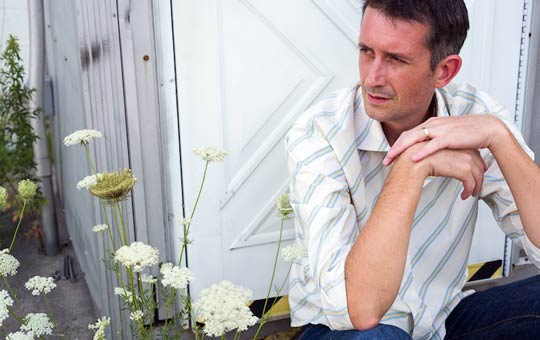Ronnie Fauss Mines the Demons of Everyday People on Built to Break

Courtesy the artist Music is a part-time gig for Ronnie Fauss, but "Built to Break" is a great record all the same
This week, Dallas-based songwriter Ronnie Fauss released Built to Break, his second full-length effort for the New West Records imprint Normaltown. Of course, that total doesn't include the handful of killer alt-country EPs Fauss delivered before his 2012 Normaltown debut, I Am the Man You Know I'm Not. Since 2009, Fauss, who was raised in Houston before moving to town years ago, has been as reliable of a source of solid roots-rock as there is to be found in North Texas. This new album successfully continues an impressive streak of simply offering up one enjoyable collection of songs after another.
The tunes on Break often deal with folks living less-than-ideal lives, which, in reality, accounts for most people walking the earth. But instead of simply stopping with general themes and greeting card-style blanket statements, Fauss deals in specific details. Just as the artists he looks up to such as Todd Snider and John Prine have done for years, Fauss exposes the individual crevices in relationships and intimate inner-thoughts.
See also:
Ronnie Fauss and Rhett Miller Debut Exclusive Track, "Eighteen Wheels"
Ronnie Fauss Goes West
In "A Place Out in the Country," Fauss delivers an upbeat, beer-sloshing arrangement mixed with simple, but telling, lines such as, "Honey, I got a lot of love inside me and that's where it's going to stay," and "I've got sins that would make the devil blush." The song is a fine example of how Fauss delivers the salt with the sweet, but before we start to wonder what he's done to be such a jerk, it's important to note that Fauss is indeed a storyteller, not a heart-on-sleeve gusher.
"No, that song is not autobiographical," admits Fauss. "It's just alluding to the darker sentiments that most of us keep hidden." Fauss continues with his brand of dark humor that lightens up all of his records by declaring, "I haven't buried any bodies that you know of!"
Certainly Fauss has his share of sins hidden to where we'll never see them, as we all do. One crime he's not guilty of, however, is grabbing too greedily for full-time musical stardom at the cost of anything else valuable in his life. He's in his early 40's now and a married father of three young kids with a full-time day job he's been at for several years now. Though he's performed and recorded across the country, including a recent gig at Los Angeles's famed singer-songwriter haven, Hotel Café, an all-encompassing life on the road isn't in the cards for him, and he's fine with that. For, as much as he's a clever yarn-spinner, he's a practical man that simply loves his family and holds them in an appropriately high-regard, which is admirable in is stark reality.
"Becoming a full-time touring musician isn't really on the table for me. It's not a goal of mine," Fauss admits. "As a full-time musician, you have to tour, and with three young kiddos at home, I have no interest in that. I was gone for two straight three-day weekends playing shows last month and it just about killed me."
Of the new record's 11 tunes, it's a couple of duets that offer a great glimpse into the record's thematic scope. The rollicking trucker-rock anthem "Eighteen Wheels" featuring Rhett Miller and the solid AM country gold of "Never Gonna Last," which features the sweet but dusty vocals of Nashville-based Jenna Paulette, are songs that eschew first-person confessions for setting colorful stages packed with grit, hard-luck and the freedom of resignation.
But it's the true story behind the album's creation which offers the wildest ride of them all. With the help of producer Sigudur Birkis, who produced Fauss's previous album, sessions for Built to Break took place from January through June of this year in multiple locations. A few days recording here, a few days of recording there. It wasn't a logistically smooth process, but it certainly didn't hurt the end result.
"The easier question to ask might be where the album wasn't recorded," Fauss exclaims. "We started out in Colleyville, outside of Fort Worth. Taylor Tatsch, who is a member of the Orbans, has a great studio out there where we did some pre-production and drum recording with Sigurdur. From there, we went to Nashville, where we spent a week at Paul Ebersold's studio, the Bakery, adding guitars, bass and many other bells and whistles. We then spent a long weekend in Chicago, recording vocals at night and going to Cubs games during the day. And from there, we spent the spring listening to all we had done, trading ideas and coming up with things to add, which we would do in Dallas.
"Two friends of mine who also play in my band, Eric Neal and Chris J. Norwood," he adds, "have studios and we added some parts here and there. In the summer, the record was mixed in Houston, and then mastered in New York. So, this record was pretty much made everywhere."
Among the additions made to the record in Dallas were the elegantly applied harmonies of Camille Cortinas, with whom Fauss has performed many a song-swap with locally. Cortinas lent her stunning voice to both "The Big Catch" and the most attention-grabbing song on the album, the deftly covered Phosphorescent lo-fi epic, "Song for Zula"
That song specifically might best represent the great ability Fauss has to present something in compelling story form that isn't ripped from his own personal Facebook page and make it seems as though it is. Such a gift isn't common, and it's one that will likely keep Fauss awash in rich piles of song ideas whether he's at home with the kids, in his office or performing to folk lovers in another part of the country.
Advertisement






































